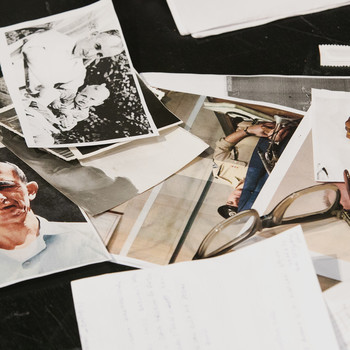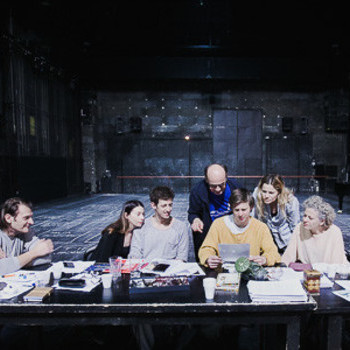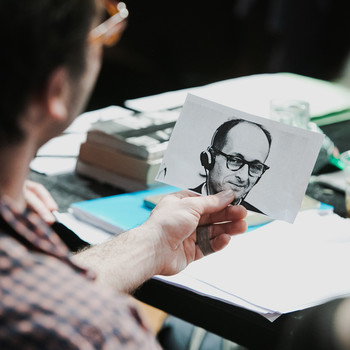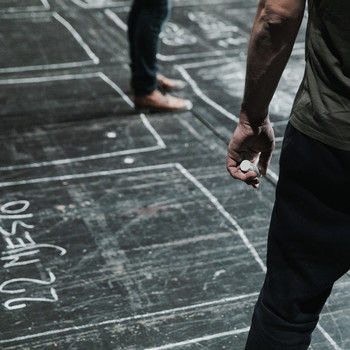After Hannah Arendt
Eichmann in Jerusalem
ZKM (HR)
Schedule
Première: 22. 3. 2019, Zagrebačko kazalište mladih
Running time 3 hours 30 minutes. One interval.
The performance is in Croatian with Slovenian surtitles.
Director Jernej Lorenci
Dramaturg Matic Starina
Set designer Branko Hojnik
Costume designer Belinda Radulović
Choreographer Gregor Luštek
Composer Branko Rožman
Assistant directors Aleksandar Švabić, Rajna Racz, Tim Hrvaćanin
Assistant costume designers Bernarda Popelar Lesjak, Marta Žegura
Inspicient Stella Švacov Miletić
Cast
Katarina Bistrović Darvaš
Dado Ćosić
Frano Mašković
Mia Melcher
Pjer Meničanin
Rakan Rushaidat
Lucija Šerbedžija
Vedran Živolić
Natančen pogled v temeljne elemente nekega sodnega procesa, predvsem v obliko in strukturo postopkov, pa tudi v notranja razmerja moči. V sojenju vojnemu zločincu Adolfu Eichmannu leta 1961 v Jeruzalemu je nemška filozofinja Hannah Arendt prepoznala nesporno teatralizacijo in zasnovala tezo o banalnosti zla. Odprla je širok poligon različnih tolmačenj te sintagme, ki jo je sama opazovala skozi birokratsko naravo subjekta in od teze o radikalnosti zla pristala pri njegovi banalnosti: ocenila je, da zlu vedno in povsod manjka globine, kar ga naplavi na jasno vidno in zato težko doumljivo površino navadnosti.
Obsežno raziskovanje, režiserja in avtorske skupine vključuje zgodovinska dejstva, sociološke in filozofske zapise, osebne uvide izvajalcev, prepoznavne elemente popkulture z namenom racionalizacije in kontekstualizacije zla in njegovih stvarnih posledic. Sega od dokumentarnega filma ShoahClauda Lanzmanna preko študije Karla JaspersaVprašanje krivdein romana La pelle (Koža)Curzia Malaparta do igranega filma Sojenje v NürnberguStanleyja Kramerja.
Postopek rekonstrukcije vedno in nujno terja obravnavo v merodajnem kontekstu, sicer postane vsako zlo, enako tudi dobro, banalno in splošno. Šele ko smo pripravljeni priznati, čigave strahove vse nosimo v sebi, smo pripravljeni na najtežje – soočenje z lastnim strahom.
A close look into the fundamental elements of a court trial, particularly its form and structure of procedures, but also into the inner power relations. In the 1961 trial against the war criminal Adolf Eichmann in Jerusalem, Hannah Arendt recognised a clear theatre dimension and formulated her concept of the banality of evil. She opened a wide field of different interpretations of the phrase, which she herself observed through the bureaucratic nature of the subject and shifted her thesis about the radical nature of evil to its banality: she decided that evil always and everywhere lacks depth, which leaves it on the clearly visible and hence hard to comprehend surface of the ordinary.
The extensive research of the director and the group of creators includes historical facts, sociological and philosophical notes, personal insights of the protagonists, recognisable elements of pop culture with the aim to rationalise and contextualise evil and its factual consequences. It ranges from Claude Lanzmann’s documentary Shoahto Karel Jasper’s study The Question of German Guiltand Curzio Malaparte’s novel TheSkin(La pelle) to Stanley Kramer’s feature Judgement at Nuremberg.
The process of reconstruction always and necessarily demands treatment in an appropriate context, otherwise every evil, and every good, too, becomes banal and general. Only when we’re ready to admit whose fears we carry inside us, we’re ready for that which is the most difficult – confronting our own fear.






